

Encyclopedia of Death and Dying. Death. First published Wed May 22, 2002; substantive revision Tue May 26, 2009 This article considers several questions concerning death and its ramifications.
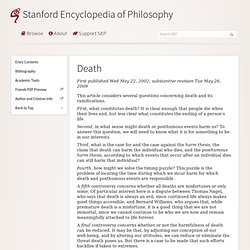
First, what constitutes death? It is clear enough that people die when their lives end, but less clear what constitutes the ending of a person's life. Second, in what sense might death or posthumous events harm us? To answer this question, we will need to know what it is for something to be in our interests. Third, what is the case for and the case against the harm thesis, the claim that death can harm the individual who dies, and the posthumous harm thesis, according to which events that occur after an individual dies can still harm that individual? Fourth, how might we solve the timing puzzle?
A fifth controversy concerns whether all deaths are misfortunes or only some. A final controversy concerns whether or not the harmfulness of death can be reduced. 1. Death is life's ending. 1.1 The Permanence of Death 1.2 Death and What We Are 2. A Bad Death « Those Emergency Blues. A few days ago a 70ish-year-old patient arrived by EMS, end-stage liver cancer, sent in by her family because she was “not feeling well”.

From home. No advance directives. She was frail and obviously unwell, jaundiced, her abdomen distended by ascites. EMS reported she was vomiting blood on the way in; her pulse was racing, her blood pressure was dropping. I asked her the paramedics to offload her into a Resus Room bed, and I followed in to help EMS lift the patient into the emerg stretcher and to help the primary nurse with the assessment. The patient looked me in the eye, a look, I think, of astonishment, vomited once, and coded.
It was a bad death. Like this: Like Loading... Mushroom Death Suit « The Infinity Burial Project. Decompiculture « The Infinity Burial Project. What is Decompiculture?
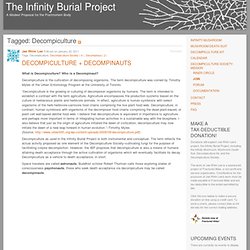
Who is a Decompinaut? Decompiculture is the cultivation of decomposing organisms. The term decompiculture was coined by Timothy Myles of the Urban Entomology Program at the University of Toronto. “Decompiculture is the growing or culturing of decomposer organisms by humans. The term is intended to establish a contrast with the term agriculture. Decompiculture as used in the Infinity Burial Project is both instrumental and conceptual. Space travelers are called astronauts, Buddhist scholar Robert Thurman calls those exploring states of consciousness psychonauts, those who seek death acceptance via decompiculture may be called decompinauts.
Buddhism and Death. The Great Unmentionable (Note: It is still often thought today that any form of belief in an afterlife is "unscientific.
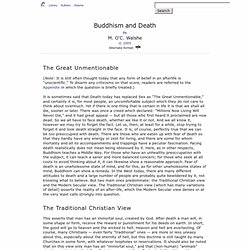
" To disarm any criticisms on that score, readers are referred to the Appendix in which the question is briefly treated.) It is sometimes said that Death today has replaced Sex as "The Great Unmentionable," and certainly it is, for most people, an uncomfortable subject which they do not care to think about overmuch. Yet if there is one thing that is certain in life it is that we shall all die, sooner or later. There was once a creed which declared: "Millions Now Living Will Never Die," and it had great appeal — but all those who first heard it proclaimed are now dead. The Traditional Christian View This asserts that man has an immortal soul, created by God.
Buddhist View on Death and Rebirth. Buddhist View on Death and Rebirth ...Ven.
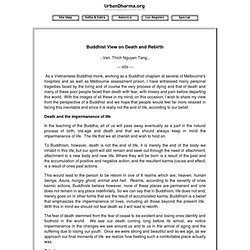
Thich Nguyen Tang... --- o0o --- As a Vietnamese Buddhist monk, working as a Buddhist chaplain at several of Melbourne's hospitals and as well as Melbourne assessment prison, I have witnessed many personal tragedies faced by the living and of course the very process of dying and that of death and many of these poor people faced their death with fear, with misery and pain before departing this world. With the images of all these in my mind, on this occasion, I wish to share my view from the perspective of a Buddhist and we hope that people would feel far more relaxed in facing this inevitable end since it is really not the end of life, according to our belief. Hermit’s thatch › Tagore on death. Rabindranath Tagore (1861-1941) wrote essays, plays, stories, and poems, all of which gather a mature Hindu philosophy of life into a cornucopia of lyric depth and expression.
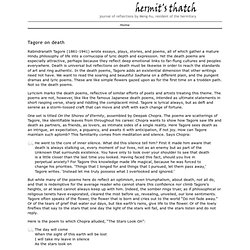
Yet the death poems are especially attractive, perhaps because they reflect deep emotional links to far-flung cultures and peoples everywhere. Death is universal but reflections on death must be likewise in order to reach the standards of art and ring authentic. In the death poems, Tagore adds an existential dimension that other writings need not have. We want to read the soaring and beautiful Sadhana on a different plain, and the pungent dramas and lyric poems. These are like simple flowers gazed upon as for the first time on a trodden path. Lyricism marks the death poems, reflective of similar efforts of poets and artists treating this theme. One set is titled On the Shores of Eternity, assembled by Deepak Chopra. He went to the core of inner silence. From time to time I feel the moment for travel has come. Deathing Home Page. A Traveler’s Guide To The History Of Death.